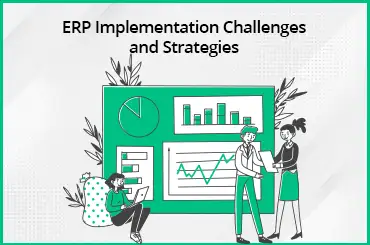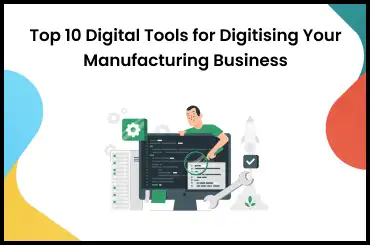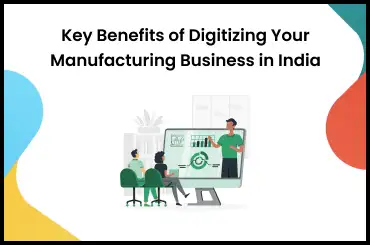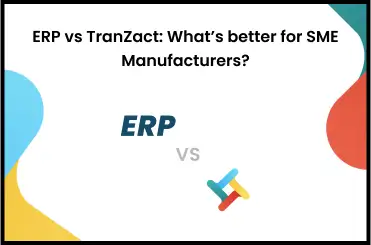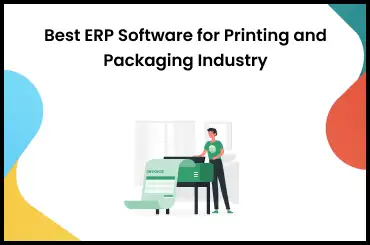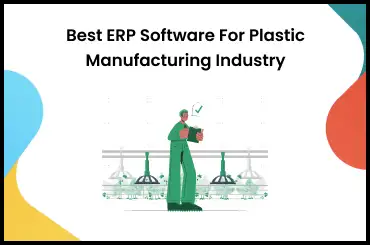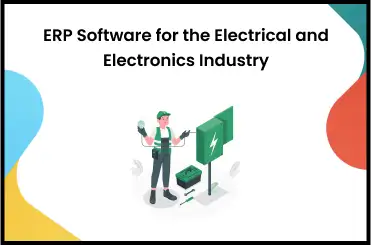The benefits of ERP system are numerous, and this is why it is used by a vast number of businesses worldwide across various industries. In times like today, where gaining a competitive edge is paramount, companies need to focus on implementing strategies that can give a boost to their business.
With the implementation of ERP, business operations flow smoothly while increasing productivity. With its key modules like inventory management, customer relationship management, supply chain management, finance, and accounting, businesses can manage their front-office and back-office operations well.
In other words, with core areas of a business within its scope, you can well imagine the immense benefits of an ERP system. Let's look at them in detail.
Benefits of ERP System
If a business house has aligned its business operations with ERP, then it can reap the following advantages of ERP:
Improves Business Efficiency And Accuracy
One of the significant benefits of using ERP is removing the redundancies in any business. ERP focuses on providing accurate and precise data across all business verticals. Additionally, it streamlines inter-departmental communication. Moreover, it integrates all the information on one platform, thus minimizing the need to surf through several spreadsheets across departments.
The advantage of better departmental connectivity results in improved efficiency. When both processes and data are in synchronization, business operations become faster and better.
Enhanced Reporting
A noteworthy feature of ERP is that it offers detailed and real-time reporting. It helps the business to report from one sole source, which is extremely beneficial. This is especially applicable to small businesses. If all the reports and essential data of various businesses are sent from a single source, then it becomes much more reliable and accurate. This reliability and accuracy then translate to the business performing better.
This makes the use of ERP software essential for almost every SME business today. The reporting from this system helps the management of the business to plan and forecast its business effectively. They can also determine their budget accordingly. Businesses can reap the benefits of cloud ERP software by making it more efficient.
Enhanced Proficiency
By streamlining and automating business processes, a business can save time and also enhance business productivity. You have the option to switch to a more productive mode of operations by adopting cloud-based ERP.
One of the benefits of cloud-based ERP is that it reduces the upfront cost, and its implementation takes lesser time. You don't need to dedicate a space for storage. Thus it reduces infrastructure and maintenance costs. With the implementation of ERP, the response rate becomes faster, which is extremely important for any manufacturing business.
Inter-Departmental Association
A clear line of communication is a must when we are looking for enhanced business efficiency. One of the benefits of using ERP is that it streamlines communication, thus making the information available to everyone in the system.
With the implementation of ERP, collaboration within the departments reaches its optimum best, thus improving productivity which is important for the success of any business. Increased productivity means lower production costs and high customer satisfaction.
Employees, too, are satisfied and happy by being in a position to view how their performance has affected the business, and how and how much they have contributed to its success. Small tasks in a business are eliminated by using the system. This leaves more scope and room for focusing on strategic work.
Augmented Flow of Cash
Every business needs a good flow of cash for smooth and enhanced operations and performance. One of the key benefits of ERP for small businesses is that it helps in reducing running costs and enhances cash flow. With the integration of the ERP system, the finance department raises invoices timely without any flaw, thus helping in raising collections for the company.
This allows companies to operate financial transactions with accuracy and on time without missing anything important. When the cash collection process of the business is streamlined, cash flow is on track; and it ensures that the company is not cash-strapped.
Save Operational Costs
Manufacturing companies need to keep a check on the status of inventory and replenish it as and when required. They also need to maintain a steady supply chain system. Hence, switching to an ERP system is the right move. One of the benefits of ERP for manufacturing companies is that it eliminates the need for separate software. This eventually saves time for data entry. Moreover, the automated system ensures that all the information is accurate.
Reduction of Lead-Time
Lead time accounts for the time between receipt of an order and its fulfillment. Using the features of ERP, companies can serve customers better. They can integrate an inventory management system with production planning, purchasing, and production departments. This will create a seamless flow of information, thus ensuring lesser lead time.
In simple words, one of the immediate benefits of ERP implementation is that it brings all the business verticals on the same platform, thereby enhancing productivity while reducing the time lag. For example, an ERP system can help automate and track the procurement process. Thus reducing the time, it takes to purchase raw materials, components, and other supplies.
Real-time Reporting
Real-time or live reporting is one of the very useful benefits of ERP systems. There are endless possibilities for improving your business using ERP and making it more productive. This system can be tailored to suit the reporting across different business functions like inventory, sales, orders, procurement, finance, and others.
Whether you want to keep track of the key parameter indicators (KPIs) or keep a check on the status of inventory, ERP systems are equipped to give you up-to-the-minute information on all the aspects that have the potential to impact business productivity. With this, you can keep track of the performance of different business verticals and also compare diverse functions to understand the strength and weaknesses of the system.
Implementing the ERP systems gives a real-time update on the functioning of different departments thus helping businesses make informed decisions. Hence, it has become critical for companies to switch to ERP to stay ahead in the highly competitive market.
Tax-Friendly Compliance
Another significant advantage of ERP is streamlining the taxation system. If you do business across multiple states, then it is key to adhere to and comply with all the tax regulations that concern your business. However, running through different tax systems can be daunting. With a consolidated platform like the ERP systems, you have all the tax-related information and functionalities in a single platform, thus making it easier for you to do tax-related transactions.
With the simplified expense and income tracking, manufacturers can easily overcome accounting errors, which eventually helps in saving costs. Moreover, some ERP systems can be easily integrated with tax compliance software systems. It helps in the automation of the complicated taxation process. Hence, as a smart business owner, you should not miss this opportunity to implement ERP and reap its benefits.
Business Flexibility
Customization of services and products have become indispensable for an organization to thrive through competitive times. The more a company can deliver solutions, the more they are liable to capture the market share and retain customers. With the integration of the ERP, you can keep a check on the status of the business operations.
Moreover, with real-time data and integrated processes across different departments and functions of a company, your business enjoys higher productivity. Having all the data centralized in one system gives you more leverage to keep a check on various business operations.
Additionally, there are different types of ERP systems i.e. cloud-based ERP, on-premises ERP, and hybrid ERP. Based on your business requirement, you can pick the best option. With enhanced flexibility, customization, and scalability benefits; the implementation of ERP gives businesses consistent growth.
Customer Satisfaction
Since retaining customers is more cost-friendly than acquiring new ones, it makes sense to keep existing customers happy. Hence, achieving customer satisfaction is one of the key goals of every business.
The customer relationship management (CRM) module of ERP will help to keep track of customer information as well as interaction and buying history. You can access useful information about customer behavior patterns and know about their needs and expectations. Accordingly, businesses can plan new sales strategies and campaigns and implement ways to improve customer satisfaction. Businesses can also improve customer service by addressing customers' queries and issues effectively.
For example, with timely follow-ups, one can keep a tab on the response of the customer and improvise services accordingly. Quick redressal of customer queries helps in enhancing customer experience.
Timely Delivery
In today's cut-throat competitive environment, on-time delivery is a must to keep customers happy. This is especially relevant for manufacturing businesses and e-commerce stores. Thanks to the ERP software system that helps to manage on-time delivery and get repeat orders. Businesses can manage the entire process from manufacturing or stocking to receiving the order and delivering it. Returns are also managed efficiently.
On-time delivery is a mandate for a successful manufacturing business. A company that fails to cater to clients' requirements is likely to encounter setbacks. However, with the intervention of the right tools and technology, you can easily overcome the issue. With ERP implementation, the delay in delivery is significantly brought down.
Analyzing and Securing Business Data
Data is like a treasure for every business. While there are many benefits and challenges of an ERP system, this software is highly instrumental in making intelligent use of the most important asset of your business - and that is your data.
From organizing huge amounts of data generated daily and putting them into spreadsheets to analyzing it and presenting it in a meaningful way through charts and graphs, ERP software does it all. It makes such tedious processes simple and quick.
Accuracy is another advantage. Moreover, when data is stored in one place with enhanced visibility, decision-making becomes easy and better by understanding the trends and patterns. ERP makes use of business intelligence technology to analyze data, data visualization, predictive analysis, and reporting.
Helps to Keep Up With Compliances
Today all businesses are ruled by certain compliances to which they must strictly adhere. Failing this, they may need to face serious consequences that could pose a hindrance to your business. So, the ERP system helps you to maintain records of all the compliances that are to be met with their exact date and time, which is considered a key benefit of ERP.
Easy Accessibility
Today almost all the software that you get in the market is remote-access friendly. And today's employees are quite comfortable managing most of their daily tasks remotely. This makes a cloud-based ERP system a boon for any company. They can easily access all the company details and information from cloud systems over the web. And this flexibility in using the ERP system acts as a boon even for employees who are always on the move.
What Types of Businesses Benefit the Most From ERP Software?
With the many benefits of ERP, every business vertical can benefit immensely from this technology. However, when it comes to manufacturing companies, the significance of ERP implementation is immense. Their solutions have helped many industries:
- Manufacturing process-oriented companies
- Electronics and technology
- Industrial machinery
- Construction
- Home improvement
- Aerospace & defense
- Automotive
- Healthcare & pharmaceuticals
- Hospitality
- Agriculture & farming business
- Clothing retail
- Consumer goods
- Food and beverage
While ERP implementation certainly has numerous benefits as discussed, there are a few downsides that you need to look at. For example, you need to train the staff to assess and use ERP. In addition, certain ERP modules may add up to the cost of maintenance and training. Hence, you must closely assess the advantages and disadvantages of ERP when you decide to implement ERP in your business.
How Does ERP Software Improve Business Processes?
ERP software helps in streamlining business processes in many ways and all departments. Here is a list of how it helps to make business processes function smoothly.
- Automates key business functions like inventory management, sales, production, and more.
- Improves accuracy of accounting and finance
- Enhances business visibility across departments
- Creates real-time reports
- Assists in business management and compliance
- Helps in customer service
How to Choose the Best ERP Software?
To reap the benefits of ERP, today a wide array of businesses of all sizes are implementing ERP systems. Selecting the best ERP software in the market is an uphill task as there are many options. Consider the following questions to help you make the right selection:
- How will the ERP software meet the requirements of your company?
- Does it fall in line with the goals of your company?
- Is it compatible with the present systems and processes?
- Does the company offer customer support and maintenance?
- What kind of training is required and if the ERP company provides it?
- What kind of user reviews does the ERP software have?
- Is it flexible and scalable?
- How versatile is the ERP software?
- What is the cost of implementation, training, and maintenance?
First and foremost map the functionalities of the ERP software with your existing business processes and problem areas. Next, assess how the ERP software will solve those.
More things to consider are ERP software functionalities and features, the reputation of the company, the time required for implementation, and the process of implementation. Have a detailed understanding of all these key aspects before the final decision.
Implement ERP and Streamline Your Business!
Considering all the benefits of ERP, you can now confidently go for the implementation of ERP. However, the effectiveness of ERP also depends on its features and implementation with the business processes.
TranZact is an advanced cloud-based software that offers ERP solutions designed specifically for SME manufacturing businesses. It integrates production, inventory, sales, and purchases to simplify end-to-end business processes!FAQs on Benefits of ERP System
1. Are there any disadvantages of ERP?
While the benefits of using ERP are remarkable, there are certain downsides that you must be aware of before going ahead with the implementation of the ERP system. These include:
- The expense of its installation
- Requirement of high operational skills
- Training of staff
- Maintenance cost
However, you have the option of switching to a cloud-based ERP system that significantly cuts down your cost of infrastructure investment and maintenance costs.
2. What are the limitations of ERP?
Although ERP offers several benefits, the implementation and maintenance of ERP are one of its major limitations. However, this timeline is based on the types of modules you want to incorporate and the training of people. It may take around a year to successfully implement and integrate ERP with your business operations. Hence, it is significant to have a close assessment of your business requirement before ERP implementation.
3. What are the benefits of an ERP inventory management system?
ERP inventory management system helps to manage logistics and supply chain better, minimize chances of errors in inventory management and improve the overall efficiency of the business. Listed below are more benefits of an ERP inventory management system.
- Integrates information across all departments with inventory functions
- Helps manage inventory seamlessly
- Ensures the safety of inventory
- Enhances the flow of goods
- Automates purchase orders and restocking
- Real-time updating of information
- Gives a complete view of stock
- Helps manage finance
- Improves customer service
4. What are the benefits of cloud ERP software?
The key benefit of cloud ERP software is that it can be accessed anytime and anywhere. Plus, the other advantages of ERP systems over the cloud are that they are very cost-effective, agile, highly scalable, and very easy to integrate.








